Do Blue Light Glasses Help With Fluorescent Lights?
Last Updated on
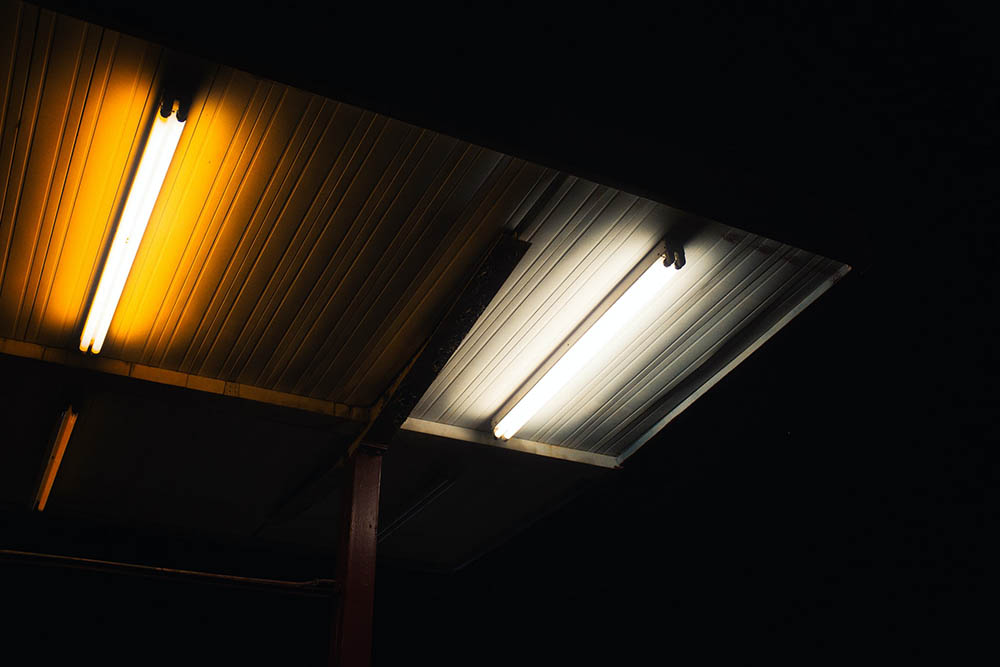
Blue light glasses are typically marketed to people who sit in front of screens for long hours. Some small studies suggest that blue light glasses may help reduce symptoms of digital eye strain, such as dry eyes, headaches, and blurry vision.
But do blue light glasses protect your eyes from fluorescent lights? Although they’re not a sure-shot barrier against fluorescent light, you can couple blue light glasses with reduced screen exposure to lessen the effects of blue light on your eyes.
What exactly is a fluorescent light, and why do you need to protect yourself from it? Also, how helpful are blue light glasses against it? Let’s explore.
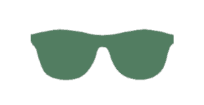
What Are Fluorescent Lights?
Fluorescent lights emit a blue-ish white light that contains more blue light than traditional incandescent bulbs. Besides blue light, fluorescent lights also have a wide range of other wavelengths across the color spectrum.
Blue wavelengths, creating blue light, only form 20% of all fluorescent light. In fact, the amount of blue light we get from fluorescent lights is much less than that coming from direct and indirect sunlight.
However, that does not mean fluorescent lights don’t pose any risks. For one, exposure to blue light is linked to eye fatigue and an increased risk for macular degeneration, a condition that could lead to blindness.
People who work in settings illuminated by fluorescent lights are susceptible to a wide range of medical issues, such as:
- Lack of concentration
- Burning or itchy eyes
- Eye strain
- Sore eyes
- Blurred or double vision
- Headaches
An American Journal of Public Health study found that long-term compact fluorescent light exposure can lead to eye diseases, such as age-related macular degeneration and cataracts. Besides blue light, these fluorescent lights also emit UV rays that are detrimental to human health.
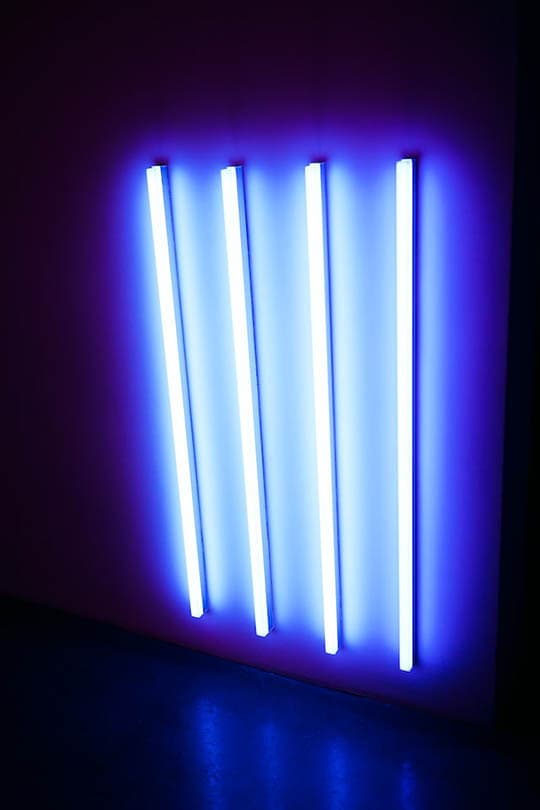
Fluorescent Light Sensitivity
Fluorescent light sensitivity is a condition where people experience symptoms such as headaches, nausea, and eye strain when exposed to fluorescent lights. The condition is also referred to as fluorescent light intolerance syndrome, electromagnetic hypersensitivity, or electrosensitivity.
A Vision Council study found that 22.8% of the participants experienced eye dryness when exposed to fluorescent lights for a long time. Meanwhile, 24% reported headaches, and 32.8% complained of eye strain. Likewise, 23.3% of the participants had blurred vision.
Are Blue Light Glasses Effective Against Fluorescent Lighting?
If you work in an office with fluorescent lights, you may wonder if blue light glasses can help mitigate the risks. Unfortunately, there’s no definitive answer, as studies on their efficacy are limited. However, blue light glasses may offer some protection against eye fatigue caused by fluorescent lights.
A recent study showed that blue-blocking lenses, typically used in blue light glasses, do not alter the symptoms of eye strain due to long-term computer usage. Thus, you should not expect blue light glasses to work wonders or prevent eye conditions such as macular degeneration.
Currently, the only well-researched benefit of blue light glasses is their ability to prevent disturbances of the circadian rhythm. The circadian rhythm is the internal process that regulates when you feel awake or sleepy.
Light is one of the main cues that help synchronize this internal clock. At night, the darkness signals to your brain that it’s time to sleep. In the morning, exposure to light helps wake you up.
If you use screens before bed, the blue light they emit can prevent the release of melatonin, a hormone that makes you feel sleepy. As a result, you may have trouble falling asleep. Wearing blue light glasses in the evening can help mitigate this effect by filtering out blue light and allowing melatonin to be released when you need to go to sleep.
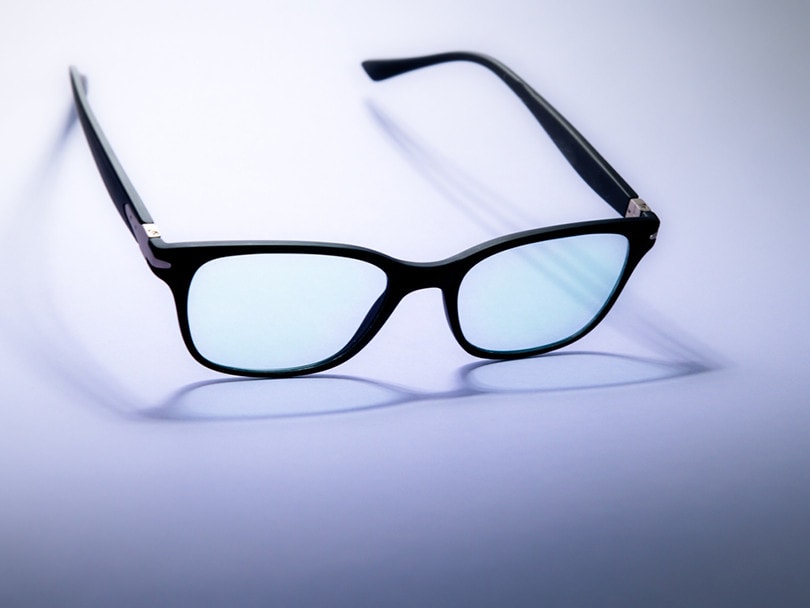
Do Blue Light Glasses Help People With Fluorescent Light Sensitivity?
Whether blue light glasses will help in this case or not will depend on the cause of light sensitivity. Some people are more sensitive to light than others due to their genetic conditions. The following conditions cause light sensitivity:
- Albinism: It is a condition in which people have a reduced amount of melanin pigment in their skin, hair, and eyes. People with albinism are more sensitive to bright lights as they have less protection against the sun’s harmful UV rays.
- Porphyria: It is a group of disorders that can cause photosensitivity or sensitivity to light. Porphyria can also lead to other symptoms, such as abdominal pain, seizures, and paralysis.
- Aniridia: People with aniridia don’t have an iris, the colored part of the eye that controls how much light enters the pupil. As a result, they are more sensitive to light.
As photophobia or light sensitivity can also result due to damage to nerves, any head or eye trauma later in life can also make someone highly sensitive to light. Besides medical conditions, your behavior may also make you more susceptible to light sensitivity.
For instance, if you are exposed to strong light for many hours a day or have a habit of looking directly at the sun, your eyes may sustain damage over the years. While blue light glasses may help in these conditions, they won’t do anything if you have a genetic condition causing photosensitivity.
In that case, solving the underlying condition is the only way to prevent strain and eye fatigue resulting from fluorescent light exposure.
How to Choose the Right Blue Light Glasses
If you decide to get blue light glasses, make sure to purchase a pair that filters both UV and blue light. Also, choose a pair that is comfortable to wear for long periods. Most people who work in offices illuminated by fluorescent lights tend to be at work for at least six to eight hours. Thus, you need a pair of glasses that won’t cause eye fatigue.
If you wear contact lenses, look for blue light glasses with an anti-reflective coating to reduce the glare from your lenses. Plus, this coating will also make it easier for you to see through your glasses.
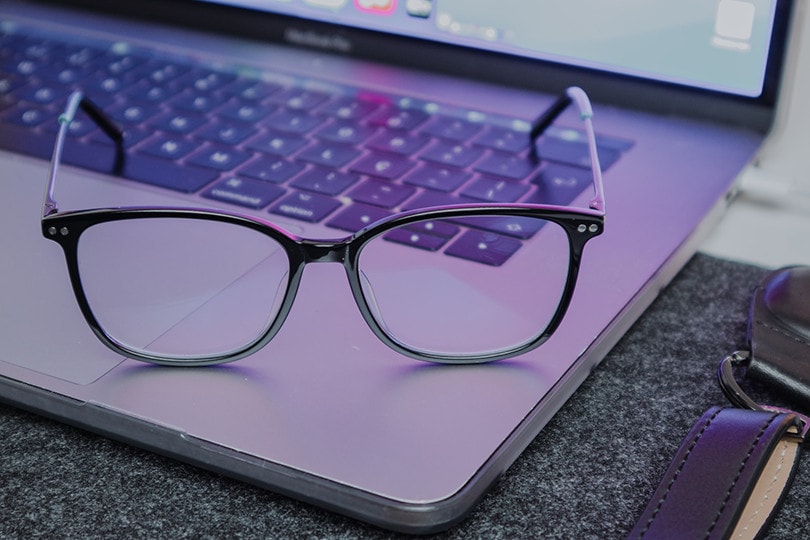
Blue Light Glasses Alternatives to Help with Fluorescent Lights
While the efficacy of blue light glasses against fluorescent lights hasn’t been proven in any significant scientific study, there are some other methods you can use to reduce the impact of fluorescent lights on your eyes. Here are some of them:
Use Natural Lighting
If you work from home or have some control over the lighting in your office, try to use natural lighting as much as possible. It will help reduce eye fatigue and strain from exposure to artificial lights. Here’s what you can do:
- Place your desk or workstation near a window so you can take advantage of natural light.
- Opt for task lighting instead of overhead fluorescent lights. Task lighting is more focused and won’t cause as much eye strain.
- Install LED lights that emit soft, diffused light instead of harsh, fluorescent light.
Take Breaks Often
Make sure to take regular breaks while working and give your eyes some time to rest. You can also blink frequently or use an eye lubricant.
The 20-20-20 rule is perfect in this regard. It states that for every 20 minutes you spend looking at a screen, look at something 20 feet away for 20 seconds. It will help reduce eye fatigue and prevent dry eyes.
Use a Fluorescent Light Filter
A fluorescent light filter is a screen protector that you can attach to your monitor to reduce the amount of blue light and glare from your screen.
These filters are available in different sizes and shapes, so you can find one that fits your monitor perfectly. Plus, most of them are affordable and easy to install.
These are a must-have if you experience fatigue, eye strain, or migraines due to long working hours of screen exposure. When choosing a filter, opt for something that softens the light while allowing you to see the screen clearly.

Conclusion
While blue light glasses may be an intervention for delayed sleep-phase disorder or other sleep disturbance issues, there’s little to no research to prove their effectiveness against digital eye strain caused by fluorescent lights or screens. However, there is no harm in wearing blue light glasses.
So, you can try them out and see if they help reduce your symptoms. If not, consider using other methods, such as taking regular breaks, using a fluorescent light filter, or switching to natural lighting. Depending on how much control you have over your work environment’s lighting, you may also replace the fluorescent lights with task lighting or LEDs.
Featured Image Credit: Adam Kring, Unsplash
Table of Contents
- What Are Fluorescent Lights?
- Fluorescent Light Sensitivity
- Are Blue Light Glasses Effective Against Fluorescent Lighting?
- Do Blue Light Glasses Help People With Fluorescent Light Sensitivity?
- How to Choose the Right Blue Light Glasses
- Blue Light Glasses Alternatives to Help with Fluorescent Lights
- Conclusion
About the Author Jeff Weishaupt
Jeff is a tech professional by day, writer, and amateur photographer by night. He's had the privilege of leading software teams for startups to the Fortune 100 over the past two decades. He currently works in the data privacy space. Jeff's amateur photography interests started in 2008 when he got his first DSLR camera, the Canon Rebel. Since then, he's taken tens of thousands of photos. His favorite handheld camera these days is his Google Pixel 6 XL. He loves taking photos of nature and his kids. In 2016, he bought his first drone, the Mavic Pro. Taking photos from the air is an amazing perspective, and he loves to take his drone while traveling.
Related Articles:
How to Clean a Refractor Telescope: Step-by-Step Guide
How to Clean a Telescope Eyepiece: Step-by-Step Guide
How to Clean a Rifle Scope: 8 Expert Tips
Monocular vs Telescope: Differences Explained (With Pictures)
What Is a Monocular Used For? 8 Common Functions
How to Clean a Telescope Mirror: 8 Expert Tips
Brightfield vs Phase Contrast Microscopy: The Differences Explained
SkyCamHD Drone Review: Pros, Cons, FAQ, & Verdict
